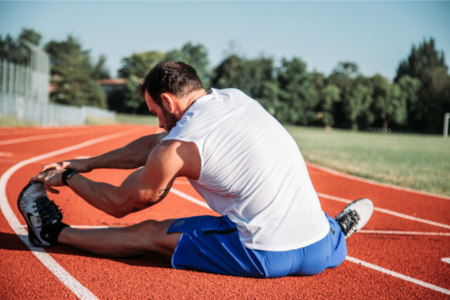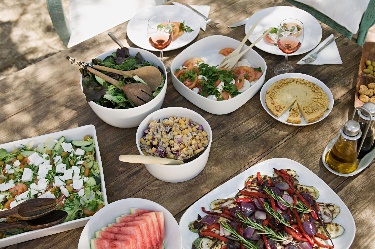
Kickstart Yourself Back Into Movement
By Leanne Hall on
We’ve all been there. Hitting the gym regularly, eating really well and feeling fabulous. Then it happens. Maybe we over eat at a work function, or take a week off the gym because we’ve been feeling unwell. Or maybe we just feel bored with our current fitness routine. Whatever the trigger, the result is the same. Motivation takes a drastic nose-dive and we find ourselves frustrated, and perhaps even depressed at the fact that we just can’t seem to pull ourselves together and get back on track.
So how can you get back on the health and fitness wagon? Well, here are my tips to help get you back to your healthy self again!

Identify Obstacles
When motivation disappears, the first question you need to ask yourself is this: “Why?”
Identifying...

How much alcohol is OK? Balancing risks and benefits
By Emily Banks on
For many of us, alcohol is an enjoyable backdrop to life: wine with dinner, beers with friends, a glass of bubbly to celebrate a special occasion, or nip of something heavier to unwind after a long day.
But alcohol is the fourth-largest cause of disease in Australia after excess weight, smoking and high blood pressure. So, how do you decide whether – or how much – to drink?
Unfortunately, the answer is far from simple and falls into the murky realm of “it depends”. Let’s consider what the science says about the positive and negative effects of alcohol.

Injury
Drinking alcohol increases your risk of accidents and injury. Only tobacco outranks alcohol as the leading preventable cause of drug-related death and hospitalisation in Australia....

What is a Balanced Diet
By Warren Maginn on
With health as the new currency, having a balanced diet plays an integral role in every path to wellness. What a balanced diet means, though, is open for interpretation. Clinical Nutritionist and Spokesperson for Nordic Naturals, Warren Maginn, shares his simplified guide to a balanced diet.
A balanced diet should contain a mix of vegetables, protein, carbohydrates and foods rich in omega-3s. Proportion is key to getting the ‘balance’ right.
Here are a few things to keep in mind when meal planning.

1. Colour Your Dinner Plate
Regardless of your fitness/weight loss goals, every diet should have a sufficient amount of vegetables. For the average adult, 5 serves of vegetables is the recommended amount. You can improve the nutritional value...

How to Set Goals
By Melissa Ingram on
Many of us set ourselves tasks and goals to achieve what we feel will make a difference to our lives. Sometimes we find it difficult to achieve these goals as the journey becomes too long, too hard or it simply gets overshadowed by other ‘higher priority’ tasks and therefore these goals are pushed to the side.
Start by asking yourself some simple questions that can help you take control of your life and achieve your goals:
- What are you trying to achieve?
- What are your habits and what do you want to change?
- What have you achieved in life?
- Do you live in the moment?

What are trying to achieve and what is your ultimate goal? Is it to live cleanly, train for a 10km fun run, sleep better, lose weight, drink more water, change careers, start a...

A Beginner's Guide to Fitness
By Kirsty Welsh on
I’ve worked in the health industry for long enough to know the biggest goal when an individual joins a gym is, ‘I want to get fit!’
What does this even mean?
If you want to ‘get fit’ you need to start with a good definition of what fitness means to you, otherwise where do you even begin? It can be overwhelming!
Here’s a little bit of help to get you going. Physical fitness can be defined as the ability of the body to perform with energy and alertness. (Yes please, where do I sign up!)

Fitness to me is not just physical; although we normally focus on the physical, I prefer to look at fitness as a blend of mental, emotional, physical and spiritual health. The beauty of physical activity is that movement allows us to think...

Australians are embracing ‘mindful drinking’ — and the alcohol industry is also getting sober curious
By Tamara Bucher and Melanie Pirinen on
In 2020, Australia’s first non-alcoholic bar opened in Brunswick. Sydney quickly followed suit. Major liquor retailers are dedicating more and more shelf space for the growing range of no-alcohol and low-alcohol drinks.
Alcohol-free wines, beers and spirits are increasingly sophisticated, driven by consumers taking more care in what they drink — and how they choose to drink.
Over the past 15 years, alcohol consumption has decreased in Australia, from 10.8 litres per capita per year down to 9.4 litres, the lowest seen in 50 years. Similar trends have been seen globally.
The reduction has been particularly stark for the younger age groups: the number of people in their 20s abstaining from alcohol increased from 8.9% in 2001 to 22% in 2019....

Health Check: how do I know if I drink too much?
By Bosco Rowland on
While alcohol is a legal and common way many societies stimulate social interaction, when consumed at high levels over long periods it can undermine physical health and cause cancers and other diseases. Most people know excessive drinking isn’t good for our health, but how do we know when we’re drinking too much?

Alcohol consumption is associated with long- and short-term consequences. Long-term health consequences include: alcohol-related diseases such as cirrhosis of the liver; stroke; high blood pressure; heart disease; and more than 60 cancers, including of the mouth, lips, throat, oesophagus, stomach, pancreas, liver, bowel and breast.
Short-term health consequences include fatalities, physical injury or road accidents due to...

Ten reasons some of us should cut back on alcohol
By Steve Allsop on
Some of us seriously underestimate how much we drink, so perhaps the first step to deciding if we need to cut back is to consider how many standard drinks are in that glass of wine, beer or spirit. A miscalculation increases the risk of drinking outside the low risk guidelines. Pouring your own drinks, topping up a glass before it’s finished, or not paying attention to your consumption influences whether you drink more than intended.

Here are some reasons why you might think about cutting down on drinking.
Here are some reasons why you might think about cutting down on drinking.
1. Improving your health
Reducing alcohol means you might find it easier to manage your weight. Some drinks have as many calories as high fat foods.
In one large...

Want to exercise more? Try setting an open goal for your New Year’s resolution
By Christian Swann on
It’s that time of year when many of us are setting goals for the year ahead. The most common New Year’s resolution – set by 59% of us - is to exercise more.
But our research suggests the way we typically set goals in exercise often doesn’t work. So, what should we do instead?
Our research interviewing elite athletes suggests one possibility is to set open goals instead.
Specific goals can actually put us off
Generally we’re advised to set specific, or SMART, goals (where SMART stands for specific, measurable, achievable, realistic and timebound). Aiming to walk 10,000 steps per day is a common example.
This advice is typically based on goal-setting theory from the 1990s. However, that theory has now evolved, with research now...